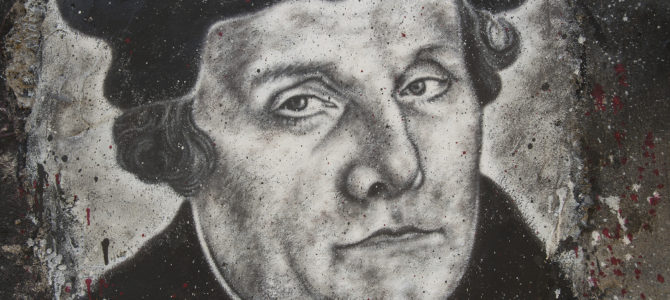
October 31 will mark 500 years since Martin Luther’s posting of 95 theses on a Wittenberg church door, thereby initiating the Protestant Reformation. In simpler days, everyone understood how to react to such anniversaries. Protestants would celebrate the “German Hercules” cleaning out the Augean stables of a decadent church, restoring the primacy of Scripture, and bringing to light its gospel of salvation by grace alone, through faith alone, on account of Christ alone. Catholics would harrumph and denounce the (allegedly literal) spawn of Satan whose revolt against godly authority and rejection of timeless orthodoxy corralled millions of souls through the gates of hell.
This year is different, though, and not simply because the anniversary marks a nice round 500 years. We now know, as our rude and ignorant ancestors didn’t, that it’s entirely impermissible to say that anybody’s theology might be defective. (Thanks, Bernie!)
Nevertheless, there is money to be made and press to be generated (and, ahem, a gospel to be proclaimed), so the celebrations will continue. And so will the lamentations. But the latter have, of late, tended less to highlight the perceived theological errors introduced with the Reformation and focus instead on what are viewed as its inevitable and detrimental social and political consequences. Hyper-pluralism; rampant individualism, relativism, and subjectivism; rapacious capitalism and soul-destroying consumerism; aggressive statism and secularism.
Yes, Luther Makes a Convenient Scapegoat
This focus makes a certain amount of sense, insofar as any Protestant with a pulse should also be able to recognize—and decry—the moral profligacy and intellectual vacuity that typifies the late modern west. But it’s also just plain stupid.
The unmistakable impression one takes from many of these narratives of decline is that, had Luther and his heirs not destroyed the unity of Christendom, the western church and nations 500 years on would still be Yuuuge! So big and beautiful! Doing so much winning that we might get bored with winning! But, alas, that’s not happening, and we can’t Make Christendom Great Again because Luther wrecked it all by ushering in “modernity.”
To be sure, such genealogies usually acknowledge that Luther didn’t intend his Reformation to have such deleterious effects; they’ll even grant that he would be horrified by its half-millennium-later consequences. (Never mind that these concessions also tend to imply that he must have been incredibly thick or willfully blind not to have foreseen this trajectory.)
Often there is even some nuancing of the Reformation’s causal role. Perhaps it wasn’t the direct and immediate cause, but surely it was a “catalyst” that “sparked,” “hastened,” “precipitated,” “helped open the door to,” “brought about many of the preconditions for,” “cleared a considerable amount of space for,” or “aided in the rise of” liberal modernity. Again, the impression with which one is frequently left is crystal clear. No Reformation, no modernity. Modernity bad, ergo Reformation bad.
Let’s Try Out this Logic On Another Event
If you’re inclined to predicate that evaluative judgment on that historical logic, you might first want to consider the broader implications by applying a similar train of thought to some other historical persons and events. Say, for example, the conversion of the Roman emperor Constantine and the rise of Christendom itself.
Like Luther, Constantine changed his mind about the theology on which he had been raised. (Unlike Luther, whose gradual breakthrough resulted from years of rigorous biblical study and intense academic debate, Constantine’s is attributable to what was likely an entirely natural solar phenomenon followed by a successful military coup—but let that pass.) Like Luther’s, Constantine’s conversion had very public ramifications. It could hardly have been otherwise since he was a Roman emperor.
But being now also a Christian, he was unlikely to continue the persecution of Christians his immediate imperial predecessors ruthlessly carried out. Indeed, with church and empire now meeting in the very person of Constantine himself, their previously antagonistic relationship might become one of patronage, protection, and promotion.
So it did. And much good came of it. But just a few of the less savory consequences thus “sparked,” “hastened,” or “precipitated” by the integral but often ambiguous church-state relationship that defined Christendom? Conversions at sword-point. The ghettoization or explusion of non-Christian populations. The judicial murder and military slaughter of tens of thousands deemed to be heretics.
No conversion of Constantine, no Christendom. But if you happen to be a Christian, are you really going to follow up that historical logic with the judgment that Constantine’s eternal salvation was therefore a lamentable tragedy?
Sorry, History Is Messier Than That
Perhaps you’d rather try to dampen the talk of inevitability and put some ideological distance between that fourth-century conversion and the systematic iniquities of later European emperors, popes, kings, and prince-bishops. Surely Constantine intended no such things; certainly he would have been aghast at such “consequences” of his reception of Christianity! But if similar protests don’t get Luther off the hook, why should they exonerate Constantine?
Turns out that history is messy, certainly far too messy for simplistic just-so stories told for the sake of triumphalist chest thumping or partisan blame games.
Still, if you want to begrudge celebrations of the Reformation and bemoan it as having caused the decline and fall of western civilization, carry on. It’s a free country. (For which, if you insist on embracing teleological narratives, you might go ahead and thank the Reformation.)









